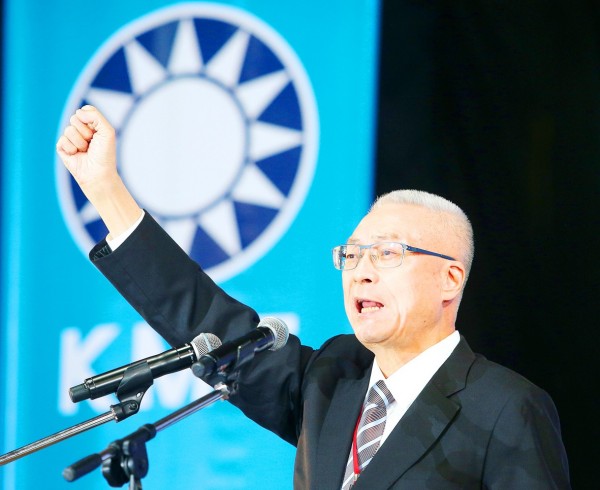《TAIPEI TIMES》 Wu vows to reform, moderate policy

Chinese Nationalist Party (KMT) Chairman Wu Den-yih yesterday delivers his inaugural address at the KMT National Congress in Taichung. Photo: CNA
’1992 CONSENSUS’: The former vice president promised to boost the economy, while the KMT congress voted to rescind a proposal to negotiate a peace pact with China
By Chen Wei-han / Staff reporter, in TAICHUNG
Chinese Nationalist Party (KMT) Chairman Wu Den-yih (吳敦義) was inaugurated yesterday during the party’s 20th National Congress in Taichung, and the party’s platform was amended to rescind a proposal to seek a peace treaty with China.
In his inaugural address, the former vice president stressed the so-called “1992 consensus” and pledged to reconnect the party with the nation’s young people and boost the economy to revive the party.
He reiterated the “original wording” of the “1992 consensus”: that “both sides of the Taiwan Strait should adhere to the ‘one China’ principle, but both sides agree to make its own interpretation of what that means in oral form.”
“On the basis of the 1992 consensus,’ we will continue to oppose Taiwanese independence and promote Chinese culture to facilitate reconciliation and mutual respect between two sides of the Taiwan Strait,” Wu said.
The “1992 consensus” — a term former Mainland Affairs Council chairman Su Chi (蘇起) said in 2006 that he had made up in 2000 — refers to a tacit understanding between the KMT and the Chinese government that both sides acknowledge there is “one China,” with each side having its own interpretation of what “China” means.
Former president Ma Ying-jeou’s (馬英九) administration inked 23 bilateral agreements with China due to its adherence to the consensus, Wu said.
Wu’s speech marks a return to the KMT’s long-standing “one China, different interpretations” framework after former KMT chairwoman Hung Hsiu-chu (洪秀柱) favored a pro-unification “one China, same interpretation” framework.
However, Hung criticized the new amendment, saying that it “dilutes the ‘one China’ principle and stresses ‘different interpretations,’” which she feared would be interpreted by Beijing as an announcement of “Republic of China [ROC] independence” — an idea promoting an independent Taiwan under the ROC framework.
The “1992 consensus” underlines both the “one China” principle and unification, and Wu’s platform only deals with the former part without advancing cross-strait relations to the “deep-water zone,” she said.
The national congress also approved an amendment to the party platform drafted by Wu to revoke a proposal to negotiate a peace agreement with China to end hostilities that Hung pushed through to the party platform last year.
The KMT’s platform now stresses the “different interpretations” framework while professing a “firm opposition to Taiwanese independence” to “maintain the status quo of ‘no unification,’ ‘no independence’ and ‘no war’” to achieve “peaceful and stable development in cross-strait relations.”
The platform also vows to build an honest and efficient government, develop the economy and equal distribution of wealth, create a just and harmonious society, build a sustainable environment and ensure peace in cross-strait relations.
Wu also apologized for the landslide defeat the KMT suffered in last year’s general elections, in which the party lost both the presidency and the legislative majority to the Democratic Progressive Party (DPP) for the first time.
To resuscitate the KMT, Wu promised to reconnect with the youth and put forward economic policies.
The KMT is to recruit, train and promote younger party members while supporting social campaigns launched by young people, while a volunteer service unit consisting of younger KMT members is to be organized to connect with voters in urban, rural and remote areas.
Wu asked officials from the municipalities governed by the KMT to improve local business environments to attract investments and create jobs.
While disunity between KMT headquarters and its caucus marked Hung’s term, Wu called for a closer collaboration between the party’s sub-organizations, with the KMT caucus asked to take advice from local chapters and think tanks.
The KMT has to gain ground in next year’s mayoral and councilor elections — the first major test of the party since last year’s devastating defeat — if it wants to regain the presidency and legislative majority in the 2020 general elections, Wu said.
The new KMT leader also criticized the DPP government for the cross-strait deadlock, what he called a divisive push for pension reform, the Forward-looking Infrastructure Development Program budget and the exodus of Taiwanese businesses and workers.
The DPP administration, during the course of pension reform, has provoked conflict along occupational lines, with public employees bearing the brunt of pension reform, he said.
The four-year, NT$420 billion (US$13.8 billion) development project could not solve the shortages in power, water, workforce and development, but aims to disperse pork-barrel projects to local political operatives, he said.
Wu vowed to lead the KMT to prosperity and reform to solve a variety of dilemmas the nation is facing.
In other developments at the congress, KMT vice chairmen Hau Lung-bin (郝龍斌) and Tseng Yung-chuan (曾永權) were officially sworn for new terms.
新聞來源:TAIPEI TIMES



















